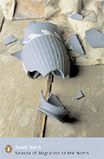2009 books

47) Tayeb Salih, Season of Migration to the North, 1969
Despite the millions of translated copies in print over the last forty years (with barely a trickle of royalties for its author) and its frequent bannings around the world this has had very few widely available English editions, so in his introduction to this new Penguin paperback Salih, who died in February, tried to outline how it has become such an important book in the wider context of African literature (and, as it was written in Arabic, was also voted the most important Arabic novel of the twentieth century). In storytelling terms it is far more successful, and several degrees more complex, than either of those equally famous post-colonial novels Things Fall Apart or From a Crooked Rib: an unnamed narrator returns from England to his village in the Sudan, only to find a newcomer who has adopted the village as his own: Mustafa Sa'eed is an enigmatic stranger from Khartoum, someone who gradually provides a very unflattering portrait of himself, centred around his own lurid experiences in England that are far more troubling, and necessarily secret, than anything anyone in the village may suspect. Tayeb Salih gives this story many interweaving layers as just about everyone submits to subconscious destructive forces that seem to spread forward and backwards, from person to person, throughout the novel. At the root of it all is the aftermath of British colonialism in Sudan, but that country doesn't come out of this novel looking at all respectable either, which along with the explicit sexual content probably accounts for its periodic banning. Certainly one of the most engaging books I've read this year.